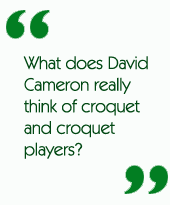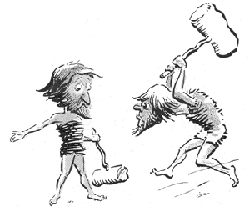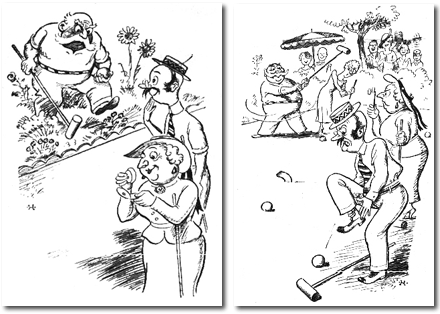

|
Back to |
| The Front Page |
| Letters & Opinion |
|
V is for vicious, V is for victory |
|||||||||
|
By James Hawkins
Posted May 27, 2006
|
|
||||||||
June 6 Postscript and Update
“This could be the first instance of a croquet game
bringing down a government.”
A day after publication of the article below, news broke about another British political figure playing croquet. John Prescott, the reviled Deputy Prime Minister, was spotted at play in the grounds of Dorneywood, his 21-acre state-provided country residence.
Prescott, former sailor, unionist and champion of the political left, has long been a figure of fun for the media. His recently publicised affair led to his demotion, and removal (at various times) of responsibilities for the environment, transport, housing and local government. Even so, he continues to hold the post of Deputy Prime Minister, deputising for Tony Blair and chairing an endless list of committees, until such time as his own party organises an election to overthrow him. This is bad news for Blair, politically beleaguered and unpopular both within the party and outside. If one goes, the other is bound to follow. The croquet game occurred at a moment when Blair was out of the country, notionally when Prescott was at the helm of the government, so what was he doing out on the lawn?
The Mail on Sunday, who broke the news, took a characteristically anti-government stance. By Monday morning, the rest of the papers were full of the news. This presented a curious clash of preconceptions – we know for a fact that croquet is only for a sophisticated elite, but we also know for a fact that John Prescott is a working class idiot. Could the class warrior suddenly achieve aristocratic status, just by an afternoon out in the sunshine with a croquet mallet? Or maybe, just maybe, our preconceptions are in need of a small adjustment?
Such philosophical points are wasted. Monday’s Daily Telegraph, itself the paper of choice for right-wing, elitist sophisticates, cast all that aside for a spot of broad humour. Prescott playing croquet? Surely not. He’s not even wearing a jacket, the philistine!
All this, of course, happened away from the restraining influence of the British croquet establishment. As luck would have it, this was a Bank Holiday weekend. The British Croquet Association office was shut for a long break, and anyone who was anyone was away for four days at the Inter-Counties Championship on the South Coast. I had calls on my mobile from the Daily Mirror, Dave Maugham was dashing off for late evening interviews for BBC Radio 4, and the hundred or so top players taking part left early each night to find out the latest developments in the story.
I came home on Tuesday night to find a full tape on the answering machine. BBC Three Counties Radio had phoned to ask if it was illegal to play without a jacket; BBC Radio Merseyside wanted to talk about my new croquet club in Liverpool; BBC News Online wanted a general chat about the game; and Hat Trick Productions wanted archive copies of the Croquet Gazette for their peak-time BBC 1 comedy news quiz “Have I Got News For You.”
But by the time I got home it was all – apparently – twelve hours too late. Croquet was Tuesday’s news. By Wednesday no one in the media was interested. Prescott had packed his bags, and was leaving Dorneywood for good. No longer having a ministerial department to run, it was deemed that his mansion could be better used by someone else within government. Inevitably, it seems that this gesture will have come too late. Prescott will leave within months, and with his departure we’re likely to see Gordon Brown replace Tony Blair.
Perhaps this will be the first instance of a game of croquet bringing down a government. As one voice on TV said during the week, “In this country, you can see the Deputy Prime Minister being forced to resign for playing croquet. In the US, the Vice President can shoot someone in the face, and no one seems to mind.”
Croquet hasn’t fared as badly as I’d feared. The nation laughs, but it’s all at the expense of Prescott. Surprisingly, we croquet promoters have never had a better week. By Friday, the Telegraph had taken full ownership of the game, and was knowledgeably explaining the rules to worried readers, keen to play at home. Asda, Walmart’s UK budget supermarket subsidiary, were reporting a 300% rise in the sales of croquet sets (retail price £9.87). Harrods in London were reporting similar increases (though their retail values are significantly higher).
All this happened during the warmest week of the year in the UK, with everyone off work for the long weekend with nothing to do. It took only the gentlest of nudges to coax people into playing the game. Not all preconceptions are negative. Whether the chattering classes see croquet as vicious or elitist is beside the point. It’s June, it’s sunny outside and we want some fun. Let’s play croquet.
Preoccupations with the diverse and sometimes contradictory melange of public preconceptions and misconceptions about the true nature of croquet are frequent and inevitable in the croquet press. There is no way to gauge with certainly the precise impact of the sport’s schizoid image that sets the tone for most of the reporting in the mainstream press of every country. This essay supplies a fresh spin, proposing “vicious” as an unappreciated positive aspect of croquet’s public image, one which organizers and promoters should not seek to cover over, but should actually tout with pride – and a measure of subtlely. If we admire members of parliament who take the floor to rip their opponent to shreds in debate, and if we cheer hockey stars who come as close to killing their adversaries on the field as the referees will allow – all in the give and take of the game – why shouldn’t croquet players be admired as well for the “vicious” tactics they employ to win on the croquet court?
Two things often happen in England in May. It’s a time for politicians to campaign for local government elections, and a time for new croquet clubs to hold their gala opening ceremonies. This year, the two occasions have bizarrely collided.

|
| The handlers of David Cameron, prominent member of parliament, though willing to have their candidate covered by the English press at the official opening the new lawns at Eynsham Croquet Club, refuse to allow the honorable member to be photographed holding a croquet mallet. Photo courtesy of Ian Plummer. |
The national press, and in particular the left-of-centre Guardian, have had great fun with this. Cameron came, cut the ribbon, and prepared himself to pose for the hoop-and-mallet publicity shot. Apparently, his spin-doctors forbad the photo, suggesting this would give the wrong impression to the voters.
Cameron is, in many people’s estimation, a true, blue-blooded toff. Schooled at Eton College and Oxford University, he’s been keen to kick aside his patrician background and foster a vote-winning, everyman image: a rolled-up shirtsleeves, straight-talking, pint of lager kind of guy. Much work has been undertaken to make him cuddly, likeable and electable. Engaging in something so ostensibly elitist as a game of croquet could scupper all that work. So, croquet photos are a definite no-no.
But what does all this media hype do for the image of croquet? For Eynsham it’s nothing but good news. Any fledgling club would kill for this abundance of column inches. And for the wider game, there are many worse examples of croquet coverage.

My question is this. What does David Cameron really think of croquet and croquet players? What of his media advisers, the journalists and the newspaper readers? Does croquet have such a harmfully negative association that any image-former would run a mile to avoid being seen in our presence?
If you ask a few players - in Britain at least - what preconceptions they face when meeting a non-enthusiast, one answer dominates, and it’s not the one about elitism. “You play croquet? Everyone says it’s a really vicious game.”
The Croquet Association seem to be at great pains to combat the V-word. Here’s an extract from a recent promotional leaflet:
“ASSOCIATION CROQUET is a challenging and intriguing sport requiring tactical ability, judgement and skill rather than strength and fast reflexes. And to dispel the myth that croquet is a vicious game of hitting your opponents’ balls into the shrubbery, any ball that is hit off the lawn is immediately replaced onto the ‘yard’ line.”

|
| This classic Crowther-Smith illustration is supplied courtesy of croquet bibliographer and historian Dr. David Drazin. |
No, hang on a moment. This is all a good thing, isn’t it? Are we really saying we'd rather croquet was non-vicious, non-competitive and uninteresting? People like to be vicious, in a mild and non-threatening sort of way. They like the promise of smashing an opponent’s ball into the rhododendrons. And they want to see David Cameron with mallet raised in victory as he smashes Tony Blair 26-0.

Okay, so outsiders have their preconceptions about the game, and we have to massage opinion if we are to encourage new recruits. Viciousness is just one of those preconceptions, and, let’s be honest, there are worse things to be accused of.
Here’s my list, though I’m sure you could add your own entries. I’ve had to counter each of these, but vicious comes way down at the bottom. Here it is:
Croquet is …
- a game for upper-class toffs;
- an old person’s game;
- a kid’s game;
- effete;
- outdated;
- expensive;
- boring;
- complicated;
- frivolous;
- vicious.
Some mistaken notions about croquet are socially driven – I’m too old / not old enough / not posh enough to play. These present a serious barrier to entry for many people. Extreme Croquet, to some extent, arose in the United States as a backlash against the backyard children’s game, reborn in a more destructive and drunken form. Gateball, the Japanese five-a-side speed variant of the game, has seen participation nose-dive after their core audience (the over 60s) decided they weren’t yet old enough or decrepit enough to start playing.

|
| Croquet has been a frequent object of fun for Punch for as long as the venerable shrine of British satire and the sport have co-existed. Many of the cartoons celebrate one of the most vicious aspects of the popular lawn version of croquet: sending the opponent's ball into the bushes. |
And yet, none of these preconceptions are shown when I tell strangers I play croquet. The typical reaction I get is one of blankness. It takes someone with a vague knowledge of the game to picture a scene of viciousness. Increasingly, I see people with no preconceptions at all.
This makes a nice change. Ten years ago, I’d have been met with sniggers and would find myself muttering something about world championships and top-class play. Now there seems to be a generation who are either too polite to react badly (which I can’t believe), or who no longer understand that croquet is inherently amusing.
Preconceived ideas come and go in waves. Many people of a certain age and social class know a little but not much about croquet. Their knowledge is often based on a limited experience of playing the game, without instantly grasping its subtleties. A generation of middle-aged middle-class opinion makers have grown up unconvinced of the game’s charms. The result is that the subsequent generation – their children – have had none of that first-hand exposure. For those under 40, it’s likely that their experience of the game will have been confined to old photographs and period dramas on TV.

Just now, I’m trying to work out a recruitment strategy for my new club in Liverpool. This is virgin territory. I know that no one I’m going to meet will have played the game seriously before. And I know that no one will have the same idea about what croquet involves. Are those who use the V-word more likely, or less likely, to join my club?
As far as I’m concerned, there’s no problem, but the croquet establishment seems keen to stamp out any suggestion that the game might be seen as “vicious” even before the public have had a chance to sample what we have to offer. Could it be that we have misdirected our energies, that we have wasted our time and resources trying to put out a public relations fire, while the rest of the world can’t even see the smoke?
Author and Croquet World co-editor James Hawkins has a good reason for being pre-occupied with croquet’s public image. Soon after the publication of this editorial, he will have banged in the first wickets on a rough lawn at his new Liverpool croquet club and begun looking for the players who will populate what could eventually become one of the largest croquet facilities in Europe, if not the world. (See The Liverpool Project, Phase I.)